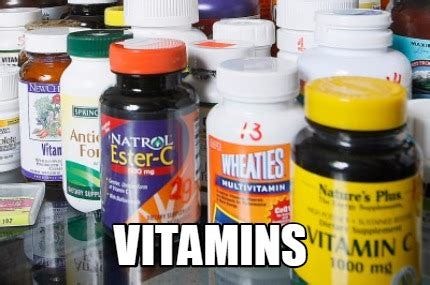
Have you ever wondered where the endless supply of vitamins comes from? Are these vitamins synthetic, or are they derived naturally? Do they do what we are told they do, or are we being misled? What really is the story behind vitamins? Did anyone know that pharmaceutical companies like Merck played pivotal roles in their development and commercialization?
The Origins of Vitamin Discovery
Casimir Funk, a pioneering biochemist born on February 23, 1884, in Warsaw, Poland, made significant contributions to nutritional science through his groundbreaking research on vitamins. Educated in Switzerland and Germany, Funk earned his Ph.D. in chemistry from the University of Bern in 1904. His career spanned institutions across Europe and the United States, including the Pasteur Institute in Paris, where he immersed himself in microbiological studies influenced by Louis Pasteur’s groundbreaking work.
In 1911, Funk proposed the existence of "vital amines," which he termed "vitamines." These compounds, he argued, were crucial in preventing and curing diseases like beriberi and pellagra. This idea revolutionized scientific understanding and laid the foundation for the field of vitamins as we know it today.

In 1913, University of Wisconsin biochemist Elmer McCollum distinguished two different species of vitamins, which he called “fat-soluble factor A” and “water-soluble factor B.”
Early Developments in Vitamin Research
The relationship between food and health has been theorized for millennia. In ancient Greece and Rome, early physicians created the "humoral" theory, which suggested that foods should balance wet, dry, hot, and cold elements to keep the body's four essential humours—fire, earth, blood, and phlegm—in harmony.
Centuries later, doctors made more precise connections, such as discovering that citrus fruits like lemons could prevent scurvy among sailors on long sea voyages.

The discovery of the vitamin B complex begins in 1889, when Dutch physician Christiaan Eijkman, working in the Dutch East Indies (now Indonesia), investigated beriberi, a condition causing weakness, weight loss, confusion, and sometimes death. Eijkman observed that chickens fed a diet of machine-polished white rice developed symptoms similar to beriberi, while those served unpolished brown rice did not. Eijkman worked in Robert Koch's bacteriological laboratory in Berlin and was also awarded the 1929 Nobel Prize for Medicine, sharing the prize with Sir Frederick Hopkins.
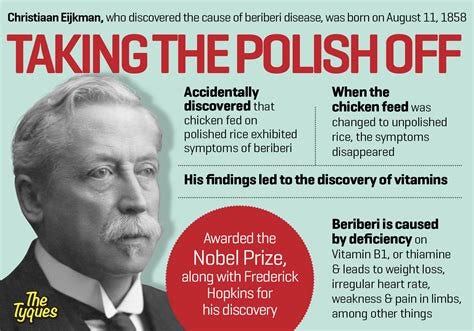
Frederick Gowland Hopkins discovered the amino acid tryptophan in 1901. In 1906, English biochemist Frederick Gowland Hopkins suggested a connection between nutrition and diseases like beriberi and scurvy. Hopkins conducted feeding tests on animals, providing them diets of purified fats, proteins, and carbohydrates, only to discover that the combination failed to sustain growth. He reasoned that there must be essential nutritional substances outside of these categories, which he called “accessory food factors.” He has also been dubbed the father of biochemistry.
Besides winning the Nobel Prize, Hopkins was President of the Royal Society from 1930 to 1935 and was elected a Foreign Associate of the National Academy of Sciences (USA) in 1924. His accolades include the Royal Medal (1918), Cameron Prize (1922), and Copley Medal (1926). Hopkins was elected a Fellow of the Royal Society in 1905, knighted in 1925, and awarded the Order of Merit in 1935. He also served as president of the British Association for the Advancement of Science in 1933 and joined the American Philosophical Society in 1937.
In 1911, Casimir Funk, working in London, advanced this idea. He proposed that unknown organic substances, which he called “vitamines,” were required in tiny amounts to maintain health. This term combined the words “vital” and “amine,” a nitrogen-containing group in organic molecules. Researchers later found that not all vitamins possess amine structures, but the term had already caught on, though without the final “e.”
In 1926, Dutch chemists Barend Jansen and Willem Donath isolated crystals of the anti-beriberi factor from rice polishings. Eijkman tested the compound and found that it cured the disease in birds. The anti-beriberi factor was the first vitamin to be isolated, confirming the theories of Hopkins and Funk. It was later named vitamin B1 or thiamine.
Merck's Role in Vitamin Development
By the 1930s, chemists worldwide, particularly those at pharmaceutical companies, raced to isolate, characterize, and synthesize vitamins. Merck had already begun this task, but reports of progress by others in the field accelerated the company’s efforts. Randolph Major (1901–1976) was chosen to head the new research and development laboratory Merck built as part of its efforts to grow basic research. These facilities, combined with a new Institute of Therapeutic Research designed to conduct clinical trials for the company, provided a solid grounding for vitamin research.

Following its success with thiamine, Merck ramped up its work on vitamins. Company leaders announced an initiative to research every vitamin—to isolate, determine the structures, synthesize, and market them. Led by Major, Merck’s scientists, like chemists Karl Folkers (1906–1997) in 1934 and Max Tishler (1906–1989) in 1937, undertook their work with the asserted knowledge that vitamin-enriched foods and vitamin supplements would supposedly prevent the diseases of malnutrition.
Merck’s research expanded to include vitamins A, B2 (riboflavin), B3 (niacin), B5 (pantothenic acid), B6 (pyridoxine), B7 (biotin), B9 (folic acid), B12 (cobalamin), C (ascorbic acid), D, E, and K. Each vitamin’s discovery and commercialization brought new products to the market, fueling the growth of the vitamin industry. Vitamin-enriched foods, particularly bread flour, were popularized to supposedly reinstate the vitamins lost in grain processing.
The Synthetic Vitamin Debate
Critics argue that the rush to commercialize vitamins may have prioritized profit over scientific rigor, potentially distorting public perceptions of their necessity and efficacy. The synthetic nature of many vitamins has sparked debates about their effectiveness compared to natural sources. Some studies suggest that synthetic vitamins may not be as beneficial as their natural counterparts, raising concerns about the health implications of widespread vitamin supplementation.
Considerations of Nutrient Sources in Vitamin Supplements
Vitamin supplements are sourced from various categories of nutrients, each with its considerations. Natural sources, derived from plants, animals, or minerals, undergo extensive processing before inclusion in supplements, often containing as little as 10% actual plant-derived ingredients, with the rest being synthetic. Nature-identical synthetic nutrients are entirely lab-made to mimic natural structures, like vitamin C, but lack associated phytonutrients found in whole foods. Strictly synthetic vitamins, such as vitamin B1 from coal tar or petroleum, replicate vitamin structures but may lack bioactive forms found in natural sources. Food cultured supplements, grown in yeast or algae, aim to enhance bioavailability but may still lack synergistic nutrients found in whole foods. Food-based supplements enzymatically combine synthetic and natural vitamins with vegetable extracts but may have limited nutrient potency and stability. Bacterial fermentation produces nutrients like CoQ10 and vitamin D2 from genetically altered bacteria, which are not naturally occurring forms and may differ in bioactivity compared to those from food sources.
Nutrient Concerns and Supplement Insights
Many individuals turn to vitamin supplements due to concerns about inadequate nutrient intake from food, influenced by soil depletion caused by modern agricultural practices. The USDA has reported a decline in nutrient content in vegetables since 1973, and absorption rates of vitamins from whole foods can vary significantly, ranging from 20% to 98%. Studies, such as a 2002 report in JAMA, suggest that daily multivitamin use may benefit adults, although the distinction between synthetic and natural sources is often not specified. However, conflicting evidence suggests that beyond treating deficiencies, supplements may not significantly promote health or prevent diseases like cardiovascular issues or cancer. In fact, some studies indicate potential risks associated with high-dose vitamin supplements, including an increased risk of certain cancers (especially breast and prostate), cardiovascular problems, kidney damage in diabetic individuals, fractures, and minimal impact on reducing infections or sick days. The American Dietetic Association advocates for a balanced diet rich in diverse whole foods as the best approach for optimal health. It's worth noting that synthetic vitamins are prevalent in fortified foods like cereals and meal replacement shakes, even when not taken as standalone supplements.
Other vitamin sources
Even if you aren’t popping vitamin supplements each day, if you consume fortified foods (think cereals, milks, breads, meal replacement shakes, etc.), it’s nearly impossible to avoid synthetic vitamins.
A report from the National Institutes of Health noted that individuals who consume high dose single nutrient supplements and fortified foods along with multivitamin/mineral supplements are at risk for undesirable effects.
Notice the synthetic vitamins added to Corn Flakes and Special K. Check out the ingredient listing.
Added vitamins and minerals in Special K and Corn Flakes.
What do supplement companies say?
Good question. I got busy with the phone and email to find out.
I called Centrum. They don’t have any information on where the nutrients in their products come from. They told me that their “vitamins are synthetic and the minerals are derived from natural sources.”
I called Bayer (the maker of Flintstone’s Vitamins) two times. They didn’t provide any response about where their vitamin supplements are derived.
I emailed CSPI. They said “most” vitamin supplements on the market are synthetic.
I emailed Vitamin Cottage. They believe that coal tar should not be a source for vitamin supplements since there are other non-petroleum materials that can be used. They also indicated that none of their vendors have C or B vitamins derived from coal.
I emailed Nature Made about vitamin B-1. They said: “We appreciate your questions concerning our supplements. Nature Made Vitamin B-1 is manufactured in a laboratory from chemicals. It is synthetically made in our manufacturing facilities in Southern California.”
I emailed GNC. They said: “GNC purchases vitamins, herbs, minerals, and other dietary ingredients from domestic suppliers as well as suppliers in many other countries from around the world. This will vary by ingredient.”
Correlation with Health Issues
As vitamin supplements became ubiquitous, so did health issues, including cancer. The correlation between the rise of synthetic vitamins and the increase in cancer rates and other illnesses is a topic of ongoing research and debate. Cancer, first scientifically documented in ancient times, seems to have seen a significant increase in diagnoses throughout the 20th century, coinciding with the proliferation of synthetic vitamins and processed foods.
5 Reasons To Avoid Synthetic Vitamin Supplements
1. Synthetic Vitamins Don’t Contain Trace Minerals, Enzymes, and Co-Factors
Trace minerals, enzymes, and co-factors are necessary for the optimal absorption and utilization of vitamins. These components facilitate chemical reactions and aid in transporting essential nutrients across cell membranes. Without these "helper molecules", synthetic vitamins may not be efficiently absorbed, limiting their effectiveness and potentially leading to inadequate nutrient levels in the body.
2. Synthetic Vitamins Can Cause Deficiencies*
Vitamins and minerals work synergistically — meaning they rely on each other's presence to function optimally. For example, vitamin D is vital for calcium absorption, and magnesium helps regulate calcium levels in the body. When you take synthetic nutrients without their accompanying co-factors, the balance of these interdependent nutrients can be disrupted, potentially leading to imbalances or vitamin deficiencies*.
3. Synthetic Vitamins Aren't Easily Absorbed As Natural Vitamins*
Even if synthetic vitamins are presented as "chemically identical" to their natural form, the body doesn't easily recognize them*. They may feel, look and taste natural, but synthetic nutrients may not be absorbed in the same way that your body would absorb natural vitamins.*
Let's take folic acid vs folate as an example.
Though previous studies suggest that folic acid, a synthetic form of folate, is capable of providing similar benefits as natural folate, there are crucial differences in how the body processes these two substances. Folic acid requires conversion into the active form of folate, known as 5-methyltetrahydrofolate (5-MTHF), before it can be utilized effectively by the body. This additional step can lead to inefficient absorption and, in some cases, even block the absorption of natural folate. Hence, relying on synthetic folic acid is not the best choice for ensuring adequate folate levels in the body, especially for pregnant moms. *
4. Synthetic Vitamins Can't Be Excreted Right Away*
Synthetic supplements often contain high amounts of nutrients. This formulation is based on the assumption that providing higher dosages will help ensure that the body receives the necessary nutrients even if absorption rates are lower. However, these increased dosages can pose potential health risks as excess vitamins can build up and eventually become toxic to the body.*
As you might already know, vitamins come in both fat-soluble and water-soluble forms. When taken in excess, water-soluble vitamins, like vitamin B, will be eliminated through your kidneys in the form of urine. On the other hand, if you take a fat-soluble vitamin, it's not going to be excreted very easily and will likely get stuck in your fat cells — leading to major side effects.
For instance, if a pregnant mom takes high doses of vitamin A, there's an increased risk for the baby to develop a birth defect.* That's why pregnant moms need to be especially careful with their vitamin A intake and should consult a health care professional for the recommended safe dosage.
5. Synthetic Vitamins Can Eventually Become Toxic*
It's important to note that the FDA doesn't check dietary supplements before they hit the market, meaning supplement fraud can occur.
Previous studies found that the lack of regulation of commercialized vitamin supplements caused them to be unsafe, leading to many recalls and false claims.
Some synthetic supplements may contain more or fewer nutrients than what's listed on the label or may even contain substances not listed at all. Taking large amounts of synthetic nutrients can harm your health, as excess vitamins and minerals are hard on the kidneys.* A lot of synthetic vitamins are also crystalline. Crystals in our bloodstream cause damage and unwanted buildup of minerals where they aren't needed, like our joints.*
Another problem with synthetic vitamins is that they have residual traces of some solvents and chemical compounds, like acetate, chloroform, hexane, petroleum, and glyphosate (an herbicide). No wonder studies have linked synthetic vitamins to an increased risk of cancer.*
Although these substances are used in the production process and are not intended to be part of the final product, their presence, even in small amounts, can still pose a health risk. The long-term consumption of synthetic vitamins containing these impurities may lead to a cumulative effect, raising concerns about their safety and potential carcinogenic impact on human health based on studies.

Recent Recognitions and Historical Context
The American Chemical Society designated Merck & Co., Inc.'s research on the vitamin B complex as a National Historic Chemical Landmark in a ceremony in Rahway, New Jersey. This recognition highlights Merck's pivotal role in vitamin research and commercialization, starting in the 1930s. Big Pharma helped to create Big Vitamin and they manufacture these vitamins to this day. The public largely seems to be none the wiser about this resulting in an approximate 39 billion dollar a year industry.
The Intersection of Big Pharma and Big Vitamin
Casimir Funk's journey from Warsaw to becoming a pivotal figure in biochemistry highlighting the dynamic evolution of scientific inquiry and its implications for public health. His discovery of vitamins not only transformed medical practices but also sparked debates about the ethical dimensions of scientific research and commercialization. The rise of synthetic vitamins and the commercialization of nutrition have undoubtedly shaped modern health practices, prompting us to question the true nature of these substances and their long-term effects on our health.
Pharmaceutical giants like Merck played a crucial role in the birth of the vitamin industry, marking the intersection of Big Pharma and Big Vitamin.
The rise of synthetic vitamins and the commercialization of nutrition have undoubtedly shaped modern health practices, but they also prompt us to question the true nature of these substances and their long-term effects on our health. As with germ theory and other scientific paradigms, the story of vitamins is a complex interplay of discovery, innovation, and skepticism, urging us to continually evaluate the science behind the sciences and our health practices.





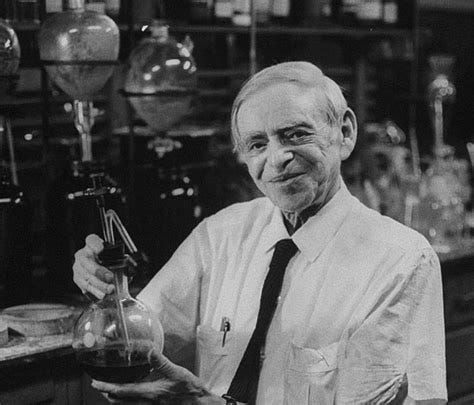



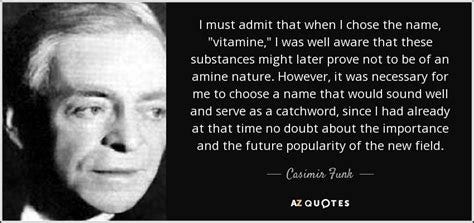


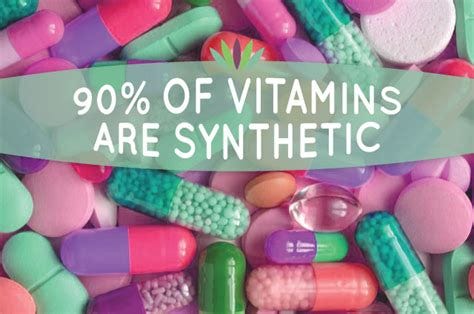

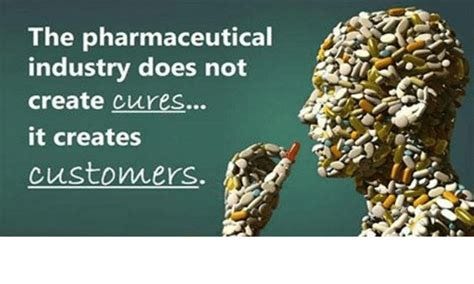



https://www.azquotes.com/author/15138-Voltaire/tag/health
Ask your doctor if Medicine for profit is right for you.